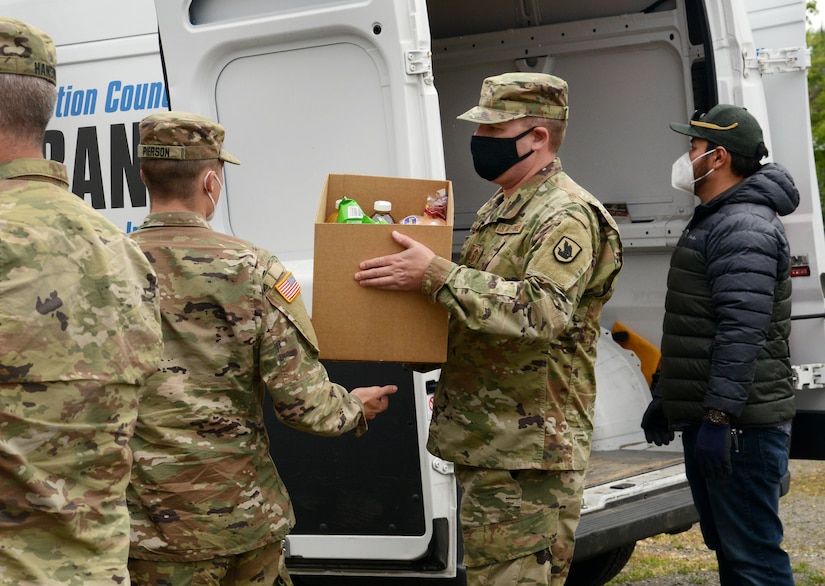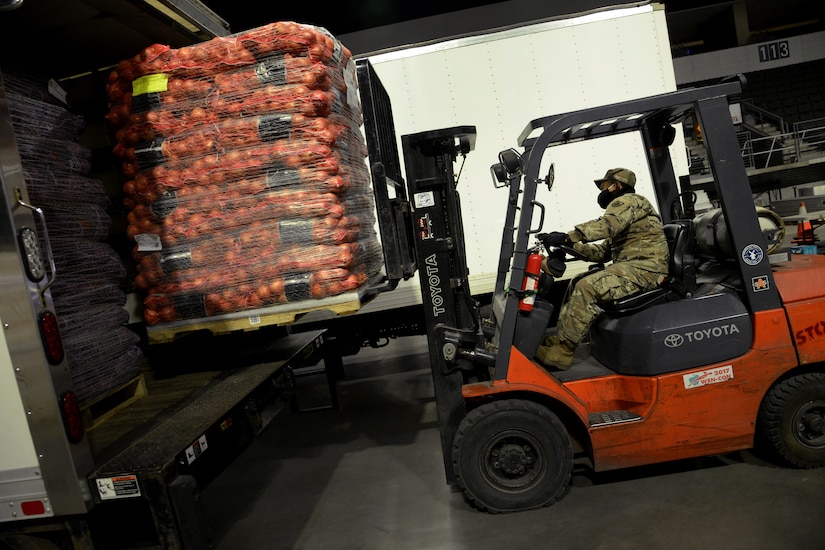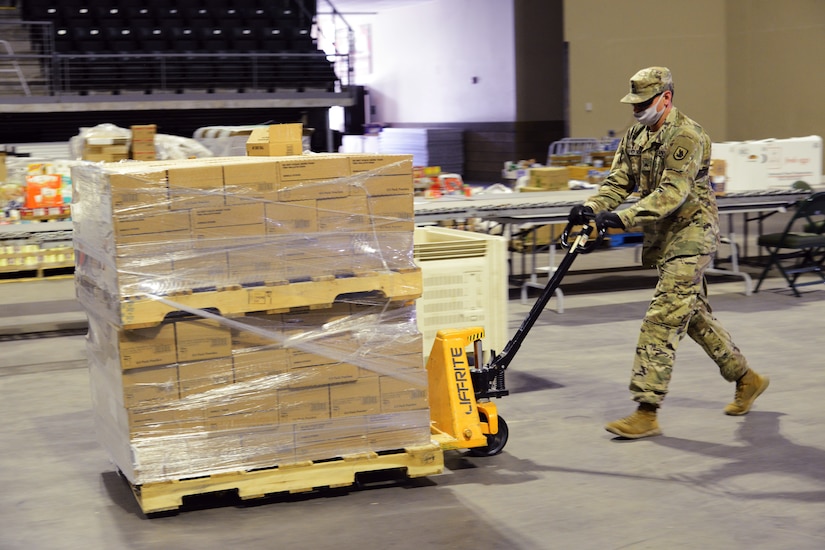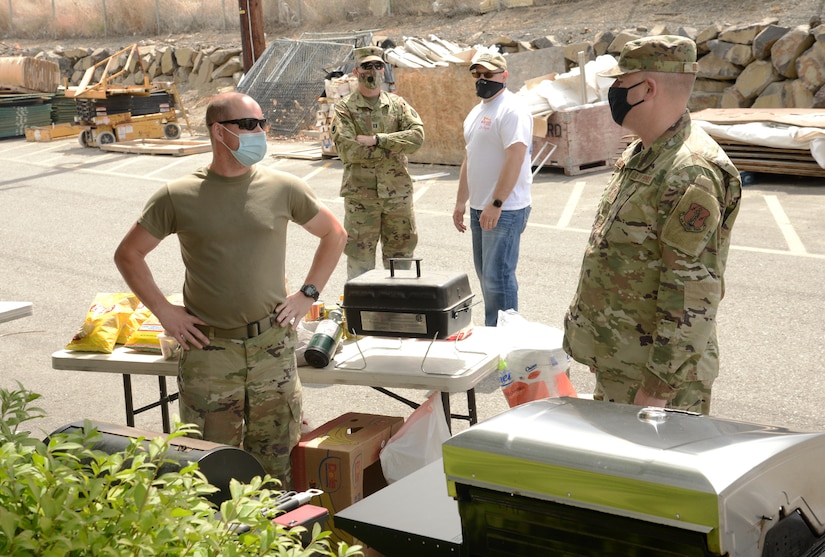The diverse and ever-changing backdrop of high plains, river basins, vineyards and vibrant groves in the Yakima Valley of central Washington rivals the setting to John Steinbeck’s novel, ''East of Eden.'' Its beautiful and expansive — yet toilsome — landscapes shape the hopes and burdens of those who live there.
Upon arriving in Pasco, just east of the Yakima Valley region, Army Chaplain (Maj.) Jeffrey Forshee, with the Army National Guard, and Air Force Senior Master Sgt. Robert Boleak of the Air National Guard arrived at one of the 50-plus state food banks supported by Washington National Guardsmen to aid Washingtonians in overcoming food constraints due to the economic fallout triggered by the COVID-19 pandemic. In a place of such abundance, the need for essential sustenance seems to be the greatest.

''We've been visiting a lot of these food banks as we connect to our service members and the civilian staff supporting these important missions,'' Forshee said. ''This is an unexpected need during these unprecedented times.''
Forshee and Boleak are part of Joint Task Force Steelhead's staff, leading the religious affairs team, operating both as spiritual leads and the eyes and ears to the members in the field.
''I found that being able to communicate back to the staff at JTF when we've spent time at one of these spots is incredibly valuable,'' Boleak said. ''Oftentimes, information is not being passed down to our soldiers and airmen at some of our sites, which only adds to some of the distress with our [service] members.''
In many ways, the religious affairs team attempts to encounter this new level of anxiety in which basic and previously held assumptions are challenged due to the sudden shift in conditions. The new normal shows that resilience and perseverance have become sacrosanct.
''There are a variety of concerns that our members have that are directly related to the COVID-19 response,'' Forshee said, detailing some of the underlying concerns and questions by service members. ''If leaders are tracking their questions and concerns, if there are too many or too few soldiers on a site, and what are the current guidelines or updates for a safe workplace.''
When the religious affairs team arrives at the locations where guardsmen are working, Boleak quickly jumps in to lend a hand, whether it is unloading a food truck or helping to set up tables at mobile distribution sites. It gives him a chance to make an instant connection and get a sense of the team's morale.
''We get out about three or four times a week,'' he said. ''I see it as a way to build camaraderie and letting them know that we're here to support them and any needs they have, as well as someone who cares about their well-being.''
Forshee perceives the site visits as being more genuine and focused than traditional religious services while meeting the guardsmen's needs in real time.
''Going out to meet soldiers and airmen is much more rewarding because when we arrive we can encounter them in many ways,'' Forshee said. ''It could be a group or just one on one, but often in unscripted moments.''
As soldiers and airmen work the food banks, testing locations and other critical COVID-19 response sites, they are personally interacting with communities experiencing economic distress and escalating fears of the virus. Knowing they are making an immediate impact is not lost on them.

''You see it instantly on some of the faces when we load a box of food and offer encouragement,'' said newly commissioned Army 2nd Lt. Will Stryker, the soon-to-be officer in charge of the Wenatchee mission. ''The first day I worked here in early May, we filled up the parking lot, and then it became twice over that within a few weeks, only to have it continue to grow as more and more people needed assistance.''
While attending Central Washington University, Stryker was activated while still a cadet. Now, since his June 12 commissioning, he's ready to take on the added responsibility for his crew, maintaining the demands and tempo for those in his immediate community.
''We've seen that while COVID is continuing along its course, more and more people who have dipped into their reserves are starting to need additional assistance,'' he said, while watching his teammates use forklifts to unload a truckload of potatoes, canned goods and other nonperishable items into the vacant hockey area. ''When I look at these stands and know that they normally would be full of fans cheering on the 'Wenatchee Wild,' it is oddly surprising to be in the center of the floor, and have it be so quiet other than us moving pallets of food in.''
More than 30 soldiers are responsible for this site. Stryker said that he's lucky to have a solid group of noncommissioned officers and a team that is so dedicated to this work.
''There are [military police], truck drivers, cooks, mechanics and infantrymen; it's an awesome crew,'' Stryker said.
As the food bank needs continue, several sites have added and rotated new members into the ranks. By late May, Army Chaplain (Capt.) Michael Johnson swapped places with Forshee, while embracing the same role of intermingling with troops across the state. After the last truck was unloaded at the arena in Wenatchee, the soldiers took part in a barbecue, allowing Johnson an opportunity to address the team while enjoying the camaraderie.
''I definitely got here on the right day,'' Johnson said. ''As a Baptist pastor, potlucks are a really big thing. If there's food, we will be there,'' he said, while jokingly speaking to everyone enjoying a well-deserved break in their hectic schedule.
''Thank you guys for what you are doing. If there's something that we can do for you or your immediate family members, we want to help,'' he said. ''It can be anything, even as a sounding board — we're there for you. Chaplains and assistants, we're here to serve you, and we're so glad to be part of this generous team.''
Johnson said he sees some of the same concerns in his community church in Yakima when he's not in uniform. Yet from a personal perspective, he noted that his path to becoming a chaplain came from financial uncertainty earlier in life.

''I was married [with] three kids and asked myself, 'What’s going on here?''' Johnson said, explaining how he enlisted in the active duty Army when trying to make a living as a musician.
''The part-time jobs, the gigging musician or being a music teacher, it all wasn't adding up, especially at the end of every month,'' he continued. ''That's when I discovered the Army Band, it was the right fit at the right time, and I went for it.''
After 10 years, he made another leap, leaving his successful music career and the full-time Army life to come back to Washington and follow another new path of ultimately becoming a chaplain.
''My experience in the Army during an uncertain period in life helped me on a personal level, and it provided the means for my family,'' Johnson recalls. ''It's made me realize now that being a chaplain is who I really am, it fits my calling to help soldiers on the religious and spiritual needs: it's the 'whole person approach' to soldier care.''
The demand to support Washington communities as large as Seattle and as small as Touchet seems to be unending, especially in the realm of food sustenance and COVID-19 testing sites across every region of the state. Since March, more than 1,000 Washington National Guardsmen have activated to support the global pandemic response. To date, nearly 28 million pounds of food has been processed, packed and distributed by Evergreen Guardsmen.
''I know for many residents, the ongoing need for these food banks is vital,'' said Claudia Limon, a service coordinator with the Blue Mountain Action Council.

The BMAC is a nonprofit, multipurpose agency, serving residents in Southeastern Washington that helps strengthen self-sufficiency, develop strategies to prevent poverty and leverage community support through volunteerism. They have teamed up with the guardsmen to keep up with the increasing nourishment needs.
A group of a dozen guardsmen have arrived in the town of Touchet, setting up tables and an entry control point as they load car after car with pre-assembled boxes of food.
''We couldn't do this without the help from the National Guard,'' Limon said, directing the long line of cars, amassed along the main roadway leading up to the mobile food bank. ''This has been a terrific partnership, especially with the need being so great.''
As Boleak helps stack boxes from one of the many trucks for this weekly distribution mission, he quietly goes about his routine of jumping in and offering a hand.
''At the end of the day, I think all of us can feel good about lending a hand while doing the people's work,'' he said, ''It all comes down to neighbors helping neighbors.''
(Air Force Master Sgt. John Hughel is assigned to the Washington Air National Guard.)








No comments:
Post a Comment